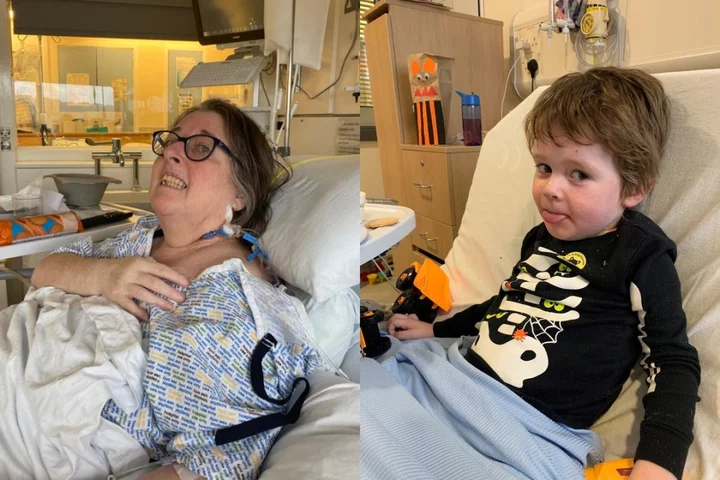
Grandmother and grandson who had sepsis at same time ‘lucky to be alive’
A grandmother who contracted sepsis which made her hallucinate, have “blotchy skin” and turn the “colour of stone” later found out that her four-year-old grandson had the condition and Strep A at the same time as her, with the pair being “lucky to be alive”. Lorna Conaghan, 63, a retired business control analyst from Gourock, Scotland, and her grandson, Alfie Crawford, four, had sepsis at the same time, and Lorna “just couldn’t believe it”. In September 2022, Lorna was due to have a shoulder replacement, but on the morning of the surgery, she “did not feel right” and felt “on edge and weak” – but put it down to nerves. Little did she know this was her first warning sign of sepsis. After informing the doctors, they soon realised that one of her organs was infected and she was admitted to the hospital’s high dependency unit. The following day, Lorna was diagnosed with sepsis as her skin began to look mottled, and doctors told her that she “would have been dead” if it was caught any later. After having antibiotics and a few more hospital visits, Lorna began to recover, but it has taken her 11 months to “go back to normal” and have regulated blood pressure. When Lorna was in hospital, her grandson Alfie, who was three at the time, had chicken pox and a cold, which developed into sepsis and Strep A. Lorna thinks that because Alfie’s mum knew about her symptoms of sepsis, it helped her realise something was wrong. Alfie’s lungs were “full of pus”, so he was put on a ventilator and was in an induced coma for over a week. He also had to “learn to walk again”, and slowly has been able to make a full recovery – with Lorna saying the family are “so lucky to still have him”. Lorna told PA Real Life: “Alfie got sick when I was in hospital, and when I found out I just couldn’t believe it. “I think me having sepsis made Alfie’s mum realise that he had more than just a cold and chicken pox. “We’re both so lucky to still be here and that Alfie is back to running around and having balls of energy.” On July 4 2022, Lorna broke her arm after slipping on her dog’s tennis ball and ended up needing a shoulder replacement. On the day of the surgery, September 30 2022, at Inverclyde Royal Hospital, Greenock, she began to “not feel right” but put it down to nerves. She said: “I told the doctors and they tested me for Covid, but I was negative, and after a few more tests they thought one of my organs might be infected. “They thought it was my heart to begin with, but they couldn’t figure out what organ it was. “The biochemist worked out which antibiotic would best kill the infection, so I was put on that straight away.” Lorna stayed in the hospital for nine days, with seven of them being on the high dependency unit. She said: “They thought it was my kidneys, so they were trying to get them functioning again. “With hindsight, it was terrifying, but I didn’t realise how serious it was at the time. “I was a strange colour, the colour of stone, and I was all blotchy. “Doctors said if they caught it much later, or if I wasn’t in hospital, I would have been dead.” Four weeks later, Lorna was admitted to the high dependency unit again after her GP noticed she had extremely low blood pressure and low heart rate. She said: “I was so confused – when family members would visit me, I’d ask them to leave because I was hallucinating and didn’t want them to see me like that. “I thought there was a castle outside the hospital – I thought I was seeing it outside my window, and I remember thinking that we’ll have to go there once I’m out of hospital.” Since then, it has taken Lorna 11 months to get “back to normal” and her blood pressure regulated. She said: “I’m still having problems with my liver, but now I’m just tired. It’s really taken it out of me. I can only take the dog so far, I’m just so tired all the time.” While Lorna was in hospital, Alfie’s mum informed her that he was feeling unwell. Stephanie did not want to worry Lorna when she was already sick, but it turned out that Alfie, who was three at the time, had also contracted sepsis. Lorna said: “He came home from nursery with chicken pox, and also had a bit of a cold. “Then it just got worse – he was having terrible pains in his back, and I think Stephanie had just listened to what I had said about my symptoms, and it made her realise subconsciously that he might be more unwell than he is coming across. “They called the paramedics, and that night he got a lot worse – when they arrived at A&E, she took him up to the desk and said, ‘We’re going to have a dead child if we don’t do something’.” Within half an hour, Alfie was admitted to intensive care at Glasgow Children’s Hospital and doctors soon realised his lungs were “full of pus” and that he had sepsis, which had turned into Strep A. So, Alfie was put on a ventilator and was in an induced coma for over a week. “Doctors made it clear to Alfie’s family that it was indeed life-threatening and that he was very lucky to be alive Lorna Conaghan Lorna said: “He had to learn to walk again – he was so weak after he woke up. “Doctors made it clear to Alfie’s family that it was indeed life-threatening and that he was very lucky to be alive. “His legs were so weak – he hadn’t eaten much while being poorly.” After having antibiotics and being in the induced coma, Alfie is now “running around”. Lorna said: “With me, I’ve had a good life, but it was so unfair to think that little Alfie could have died – he hasn’t had a life yet. “We’re just so lucky to still have him with us. “This whole experience has made me appreciate everything – when I take the dog for a walk I have a sit down on the bench and take in all the lovely scenery. “I have treated every day since Alfie and I got better as a bonus day in my life.” Read More Amy Dowden reveals ‘life-threatening’ sepsis diagnosis amid cancer treatment BBC Radio 2’s Tony Blackburn reveals he had sepsis and pneumonia in health update Martha Mills: Parents of girl who died after NHS mistakes call for new right to get second opinion Charity boss speaks out over ‘traumatic’ encounter with royal aide Ukraine war’s heaviest fight rages in east - follow live
2023-09-06 22:54

Amanda Seyfried made eyebrows blunder as a teenager
Amanda Seyfried regrets going overboard when she plucked her eyebrows as a teenager.
2023-09-06 22:48

Revolutionizing AI Computation: Introducing Custom Mass Multiplication Circuits
MELBOURNE BEACH, Fla.--(BUSINESS WIRE)--Sep 6, 2023--
2023-09-06 22:48

A Shedding Snake Trapped Itself in a Loop of Its Own Skin
He was stuck for three hours before finding a way out.
2023-09-06 22:30

Woebot Health Appoints David Mohr to Scientific Advisory Board
SAN FRANCISCO--(BUSINESS WIRE)--Sep 6, 2023--
2023-09-06 22:22

Bleat Along to Classic Holiday Tunes With This Goat Christmas Album
The music might be silly, but it's kind of catchy—and all for an excellent cause.
2023-09-06 22:21

What Happens to Unsold Halloween Pumpkins?
The unwanted gourds can wind up in a variety of places, including your local zoo.
2023-09-06 22:20

TEGNA Appoints Carrie Hofmann President and General Manager of WLTX in Columbia, South Carolina
TYSONS, Va.--(BUSINESS WIRE)--Sep 6, 2023--
2023-09-06 21:50

The Iconic Concorde Airplane Is Getting the LEGO Treatment
LEGO’s Concorde plane is as sleek as its real-life counterpart.
2023-09-06 21:45

One in 10 ‘spending beyond their means’ – try these 7 cutbacks guaranteed to save families money
Times are hard, and it’s no surprise to learn many people are spending more than they earn. New research has found one in 10 people spend more than they have in their current account at least seven months each year, and more than half (59%) spend more than they earn at least one month a year. The research, for website TopCashback, also revealed that while parents with children under 18 typically have just £179 left in the bank the day before payday, nearly three-quarters (73%) of people feel they don’t have their spending fully under control, with nearly half (47%) citing the rising cost of living as the cause. And around two-fifths (41%) admit they feel anxious about the cost of living on a weekly basis. “So many people are guilty of spending above their means – let’s face it, it’s why credit cards are such big business,” says finance expert Vicky Parry, head of content at MoneyMagpie. She says emotional spending can be a real issue, pointing out: “When we feel deprived of something, it makes us seek out that dopamine to feel good, so we online shop, and we buy things we don’t even need.” And Rajan Lakhani, a money expert at the smart money app Plum, says: “With wage growth now beginning to exceed rising costs, households may be tempted to spend even more.” But he stresses it’s important to try to get any high interest debts down before succumbing to spending temptations, and notes there are plenty of easy ways for families to reduce their spending. Here, Parry and Lakhani outline their tips for family cutbacks as the cost-of-living crisis continues to bite… 1. Avoid brands Parry advises families to stop buying branded goods in the supermarket, pointing out that the mark-up can be huge. “More often than not, it’s made in the same factory as the supermarket’s own-brand product,” she says. “If you equate a brand as a stamp of good quality, then try to change this mindset – look at the taste awards and you’ll see many own-brand and cheaper products are superior.” 2. Get the kids involved with cutting energy bills If they’re old enough to understand, talk to your kids about why it’s important to switch off lights when they leave a room, and why the heating might not be on as much when winter comes. Lakhani says: “As a dad, I’m having to constantly tell my eldest daughter to switch off the lights when she’s left the room. That helps in the short-term, but explaining to children why it’s important to do this, whether it’s the benefits for household bills or the environment, means they’re more likely to remember.” He says smart meters also provide a fun way to bring cost-saving to life for kids, as they can see the impact of switching off lights or turning off appliances that aren’t being used. “It becomes a game for them, and you can create competitions around who’s being the most energy-efficient,” he suggests, pointing out that children’s help could make an important difference, as although energy bills have fallen, prices are still far higher than they were at the start of last year. 3. Budget Keeping your eyes firmly on a budget is the first step towards stopping overspending, stresses Parry, who points out there are some good budgeting apps that tell you what your monthly budgets should be. “Have lists of items you want, items you need and items that will make your life easier,” she suggests. “If you see a top in the sale, yet ‘top’ isn’t on those lists, you’re being impulsive. It’s a good way to remember what you genuinely need.” Lakhani says it’s crucial to budget in the supermarket, and families need to “develop your special superpower” against clever in-store marketing ploys. “Have a set budget and shopping list, and ringfence how much you want to spend on groceries,” he advises. He suggests buying groceries online can help with set budgets, because you can see how the costs are totting up as you put them in your virtual trolley. “Buying groceries online also reduces the chances of being tempted by impulse purchases and kids asking for extra things, while also being easier to find offers,” he says. 4. Childcare share After-school clubs may be a necessity for some parents, but the cost can be crippling – Parry points out that the average fee for an after-school club is usually between £8-£15.50 per session, so five days a week for the 39 weeks of the school year can cost as much as £2,925 per child per year. But you can cut that cost completely, she says, by getting a group of trusted parent friends together and taking it in turns to have all the children over after school for one night each a week. 5. Walk more Although it’s often tempting to use the car for short trips like the school run, Lakhani stresses: “Walking the kids to school is not only good for your pocket, but for the planet and your health. It also gives you more face-to-face time with your children, so you have more time to know how they’re feeling and what’s going on at school. “With petrol costs on the rise again as oil prices are increasing, this is a relatively simple way to cut your costs.” 6. Beware of hobby stacking Hobby stacking is when kids develop a passion for a particular pastime, and then forget it and move on to another within a few weeks. “Before you go out and buy all the kit and gear for something which is essentially a phase, try and borrow it from a friend, or make do, until you’re sure this passion is a long-term investment,” Parry advises. 7. Cut nappy costs If you’ve got a baby, nappies can cost a small fortune, but Lakhani says you can save money by buying them in bulk or having a subscription, which are often discounted. “If you’re buying in bulk,” he says, “ensure you don’t purchase too many, as you could be left with nappies that are the wrong size as your baby grows.” In addition, compare the price of nappies at different retailers, or for an even cheaper option, use reusable nappies. Not only are they cheaper (in the long run), but they’re better for the planet too. Read More Charity boss speaks out over ‘traumatic’ encounter with royal aide Ukraine war’s heaviest fight rages in east - follow live What is combination cholesterol therapy, as study suggests it could save lives? Cancer cases in young people ‘are rising’ – the warning signs to look out for How construction expert Daniel Ashville Louisy went from social media star to TV host
2023-09-06 21:29

Credo Introduces Industry’s First Monolithically Integrated CMOS VCSEL Driver in an 800G DSP
SAN JOSE, Calif. & SHENZHEN, China--(BUSINESS WIRE)--Sep 6, 2023--
2023-09-06 21:28

PAWR Program Unveils ARA Testbed for Rural Wireless and Applications Research
WASHINGTON--(BUSINESS WIRE)--Sep 6, 2023--
2023-09-06 21:25
